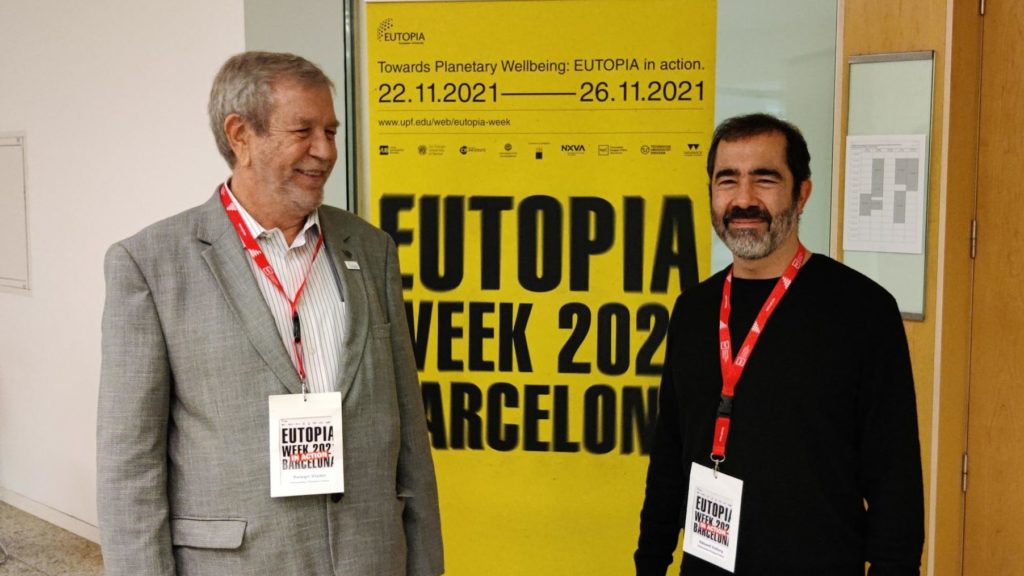Carta de la directora sobre totes les petites històries que han construït la nostra revista des de zero i la segueixen construint
special edition / Eutopia Week UPF 2021
Interview with
Pelegrí Viader and Eduard Vallory

Pelegrí Viader and Eduard Vallory are two of the leaders of the Eutopia project at UPF. Viader has a long career at UPF as a math professor among other responsibilities, and he is a former Vice-rector and current Rector’s Commissioner for Eutopia. Vallory is part of the Advisory Board of the Eutopia Alliance and he has led education and cultural projects such as Escola Nova 21 and CATESCO, the Catalan Centre for UNESCO.
How is the European Universities Initiative different from the Erasmus Program?
Viader: Well, the difference is basically in the final objective. On the one hand, the objective of Erasmus+ is to spend time in another University. Not to get an incredible amount of knowledge, but to foster contact between countries, Universities and students. It’s a brilliant initiative which has worked perfectly well, it’s great! On the other hand, the European Universities Initiative seeks the creation of a European University by confederating existing ones. You could start Economy or IBE in UPF and then decide to spend your second year in Paris, Romania, or Lisbon… It would be as simple as enrolling here or there while having your grade transcript recognized under the umbrella of a diploma of the European Union, issued by all these Universities and by EUTOPIA.
Vallory: We could say that the alliance is a further step from what ERASMUS was. Not only does it try to make students move, but it also aspires to integrate academic institutions and make their students a part of something bigger.
What is the political goal pursued by the European Commission with projects like this one?
Vallory: I would say that the same as for ERASMUS. If we are creating a Union, we have to create several communities, with academic communities being one of these. Up to this date, the student exchanges have been very important but percentually very small. EUTOPIA is about being a part of something bigger, which is a European Community, in the Academic field.
Viader: Also, the political objective is to have Universities able to compete with American and Asian ones in Europe, and to attract people from all over the world. Our Universities will be very big, with enormous potential, and also public and affordable for everybody, if not free! The higher education area in Europe will get reinforced in terms of research.

Pelegrí Viader and Eduard Vallory at UPF Ciutadella Mercè Rodoreda building, minutes before joining the Eutopia Student Think Tank presentation event.
What is your role within EUTOPIA?
Viader: I have been a vice rector in the former rector’s team and I used to be in charge of EUTOPIA, which has a Strategic Board formed by all the rectors and one student who takes care of the strategic decisions. However, each University has a vice rector or commissioner that takes care of the most practical aspects to coordinate the job within the University. Right now I am that commissioner but my mandate will terminate in a couple of weeks.
Vallory: I was appointed last year’s summer as a member of the Advisory Board by UPF.
When will the EUTOPIA project be finally implemented into the day-to-day life of a student?
Viader: It could take some time, because the new phase to create infrastructure and integration will start in December 2022. For the first four years, we will try to establish all the necessary connections, so we will probably start seeing things by 2025 or 2026. The project will most likely be fully developed by 2027.
Which are the main problems the Alliance is currently facing?
Viader: Basically, the national regulations are very different. Also, the academic structure is different, for example, the length of our degrees.
Another problem is the funding, if we want this to work properly, we should be able to move an important percentage of students. That means that if you want to stay a year in Paris, you will need some funding for that. Erasmus gives you some money but for full-year programmes, more money is required. For this problem, I think the EU is prepared to help and should be solved.
Other possible problems can be found internally, for example, the resistance of professors or students that don’t see exactly why they should do more work.
Vallory: I would say that this last one is, operationally speaking, the most relevant and it is equivalent to what happens with the process of integration of the EU. You have the day-to-day goals: problems, procedures and then suddenly, you create a new common challenge which needs everybody to move somehow. I would say that those are resistances by habits inertia, and I think we have to break this inertia.
I think that this is also related to identity. One of our big challenges is to create a sense of belonging by letting everybody know that this is something that expands our possibilities instead of being an added trouble to our day-to-day life.
This content is part of our special coverage of Eutopia Week in collaboration with the Alliance. Learn more here
Més d'aquesta edició...
Marc Tul·li Ciceró i Alexander Hamilton: dos homes que escrivien com si els hi anés la vida
Els paral·lelismes inquietants entre les vides d’un orador que s’esdernegava per salvar una república i un altre que maldava per instaurar-ne una de nova
La desafecció política: Una realitat, una sensació o una il·lusió
La crisi (o el col·lapse) del sistema representatiu
Llums i ombres a Nova York
El fenomen de ‘Sex and The City’, una anàlisi l’any 2024
- Més d'aquesta edició -
No és un article més sobre l’Universitari (o sí)
Carta de la directora sobre totes les petites històries que han construït la nostra revista des de...
Marc Tul·li Ciceró i Alexander Hamilton: dos homes que escrivien com si els hi anés la vida
Els paral·lelismes inquietants entre les vides d’un orador que s’esdernegava per salvar una república i un altre...
La desafecció política: Una realitat, una sensació o una il·lusió
La crisi (o el col·lapse) del sistema representatiu
Llums i ombres a Nova York
El fenomen de ‘Sex and The City’, una anàlisi l’any 2024
- Més entrevistes -
Entrevista a Laia Peiró i Enric Peiret
Entrevistem a la Laia Peiró i l'Enric Peiret, els caps de colla actuals dels Trempats, la colla...
Entrevista a Maribel Meléndez
Maribel Meléndez és actualment la directora corporativa del Futbol Club Barcelona. Compta amb una àmplia experiència en...
Entrevista a @Unidestroyer
A quina universitat estudies i què estudies? Tens por que algun dia la teva identitat surti a...

PORTADA • NOSALTRES • ARXIU • ESCRIU • SEGUEIX-NOS!
© Copyright 2021 l’Universitari. Tots els drets reservats. | Desenvolupament web per Pol Villaverde



